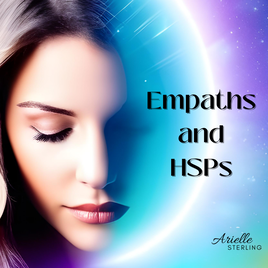 In a world filled with constant stimuli and ever-increasing demands, some individuals possess an extraordinary ability to perceive and experience the world around them with heightened sensitivity. These individuals, often called empaths or highly sensitive people (HSPs), possess a profound capacity for empathy and an acute awareness of emotions within themselves and others. Their unique nature often leads them on a fascinating journey of self-discovery and offers invaluable insights into the human experience. In this blog series, we will explore the multifaceted nature of empaths and HSPs, delving into their unique strengths, challenges, and strategies for navigating an overwhelming world. Finally, we will uncover the science behind their heightened sensitivity, shed light on common misconceptions, and offer practical guidance for self-care and emotional well-being. Whether you identify as an empath or HSP or are simply curious about these extraordinary individuals, this blog series aims to provide valuable insights and resources to support your journey. Empath or HSP?Empaths and HSPs are not merely sensitive; they possess an inherent ability to tap into the emotional environments of others. Their empathic abilities extend beyond mere intuition, allowing them to connect deeply with others' emotions, energies, and experiences. This heightened awareness can be both a blessing and a challenge, as it exposes them to a vast spectrum of emotions that can become overwhelming without proper understanding. While "empath" and "HSP" are often used interchangeably, they describe slightly different aspects of heightened sensitivity. Empaths tend to feel and absorb the emotions and energies of others, often to the point of taking on these emotions as their own. On the other hand, HSPs possess a heightened sensitivity to external stimuli, such as noise, bright lights, or crowded spaces, which can easily overwhelm their senses. Despite their experiences' nuances, empaths and HSPs share common traits that set them apart from the general population. They have a finely tuned emotional radar, an uncanny ability to sense unspoken truths, and a tendency to prioritize the well-being of others. Empaths and HSPs often navigate a complex inner world where emotions and energies intertwine, sometimes leading to profound empathy fatigue and emotional exhaustion. Understanding the intricacies of being an empath or an HSP is vital for those who possess these traits and those who interact with them. By delving into the fascinating world of empaths and HSPs, we can foster empathy, compassion, and a greater appreciation for the diversity of human experiences. Empathy is UniversalRemember that empathy is a universal human trait, and everyone is capable of feeling and connecting with others to some degree. The spectrum of empathy encompasses various levels and expressions of empathy that individuals may exhibit. At the lower end of the spectrum, some individuals may display minimal empathic abilities, showing less inclination or skill in understanding and connecting with the emotions of others. As a result, these individuals may struggle to put themselves in someone else's shoes or find it challenging to empathize genuinely. In the middle of the spectrum, most individuals demonstrate the average or typical level of empathy. They possess the ability to recognize and understand others' emotions, and they can respond with care and concern. This form of empathy, often called cognitive empathy, involves the cognitive processing of emotions, recognizing emotions in others, and intellectually understanding their experiences. Empaths, however, exist on the higher end of the empathy spectrum. They possess an inaptitude for empathy that goes beyond the average level. Empaths have a heightened sensitivity and an extraordinary ability to deeply experience and connect with the emotions and energies of others. They can intuitively pick up on subtle cues, feelings, and even the unspoken needs of those around them. While everyone has the capacity for empathy, empaths tend to exhibit an intensified form of empathy that extends beyond cognitive understanding. They have a profound emotional resonance and can genuinely feel and absorb the emotions of others, often experiencing them as if they were their own. This depth of empathic connection allows empaths to offer profound support, understanding, and validation to those in need. Empaths also demonstrate a unique ability to sense and understand a situation or environment's emotional and energetic dynamics. For example, they may be highly attuned to the moods and energies present in a room or sense the underlying emotions beneath someone's words. This heightened awareness can enable empaths to navigate social interactions with heightened sensitivity and contribute to fostering more profound connections with others. It's important to recognize that empathy exists on a continuum, and individuals may vary in their empathic abilities. While empaths exhibit extraordinary empathy, others may display different degrees of empathic capacity. The critical aspect is that empathy, in any form, allows individuals to connect with and understand others, fostering compassion, kindness, and supportive relationships. Understanding and acknowledging the unique qualities of empaths within the broader spectrum of empathy can help create a more inclusive and empathetic society where individuals of varying empathic abilities can coexist, support one another, and collectively contribute to a more compassionate world.
0 Comments
Leave a Reply. |
Arielle SterlingArielle is a best-selling author, holistic life coach and intuitive energy healer. Archives
July 2024
Categories
All
|


 RSS Feed
RSS Feed